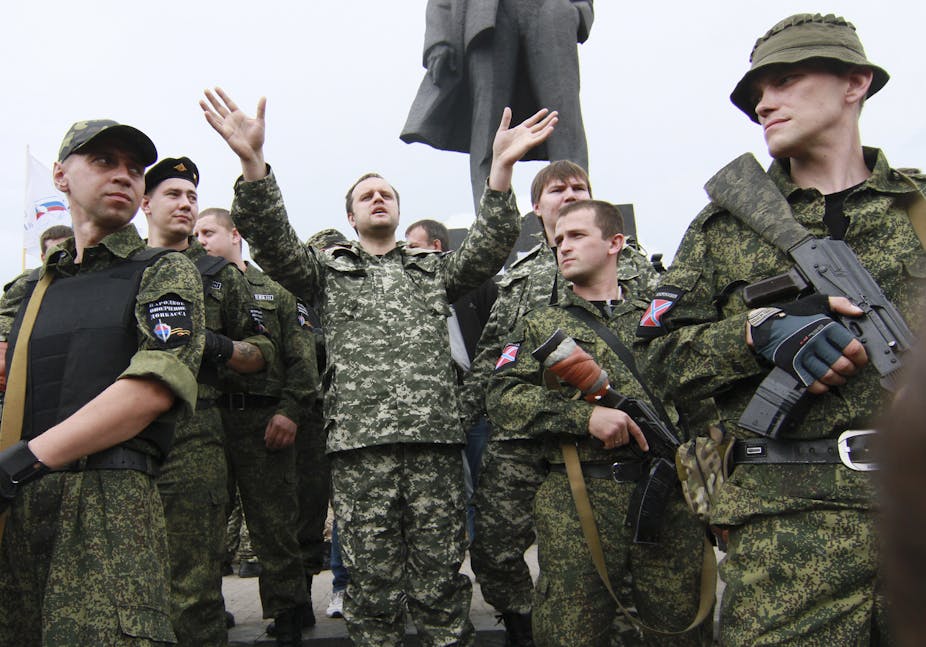There are two competing and irreconcilable narratives about the crisis in eastern Ukraine that divide public opinion and media coverage in the region and the country – as much as they divide Russia and the West.
While Russia talks of military exercises at the Ukrainian border, Kiev and its Western partners brace for an intensification of hostilities, considering the Russian troops a clear sign of an imminent full-scale invasion.
But divisions reach far deeper than that. Russia, again, stands accused of increasing its support to the separatists and forcing its proxies in eastern Ukraine to build a de-facto state that the Kremlin can easily control and use as leverage against Ukraine and the West. Meanwhile significant numbers of people, living there in deteriorating conditions, have well-grounded suspicions of the Ukrainian state and long for a semblance of order and a return to a peaceful normality, regardless of who provides it.
From Russia with love
Russian nationals now occupy key positions in the self-proclaimed Donetsk People’s Republic (DPR). Most famous among them are the DPR’s military commander (or defence minister) Igor Girkin (aka Strelkov) and its prime minister, Alexander Borodai.

Another interesting recent arrival to the DPR is Vladimir Antyufeyev, who, in contrast to Strelkov and Borodai, has significant experience in building a de-facto state at Moscow’s behest in Transnistria (a separatist region in eastern Moldova that has been protected by Russia for more than 20 years) and where he served as head of the local security services.
Now heading a team of some 40 “officials” from Transnistria helping to build state institutions in Donetsk, Antyufeyev embodies the extent to which Moscow is asserting control over key functions of what may yet turn out as another de-facto state under the Kremlin’s control and in a similar vein to Transnistria.
Russian-led and Russian-sponsored state building raises the question of where this leaves local activists such as Denis Pushilin, the speaker of the DPR’s parliament, and Pavel Gubarev, the self-styled “people’s governor” of Donetsk.
A separate reality
We interviewed Gubarev. It was striking how deeply he had embraced the ideology of Novorossiya, arguing that “the areas now in south-eastern Ukraine have always been Russian, that people who live here have a different mentality, and that they always saw themselves as part of the Russian world.”
How deeply this is ingrained in the identity and mentality of ordinary people is also obvious from Gubarev’s claim that the downing of MH17 was a “clear example of American provocation. Americans shot down the aircraft in order to discredit Russia and the rebel troops.” This is as common a belief in Gubarev’s neighbourhood, as is the opposite view in much of the West.
Common myths of ancestry and beliefs to one side, Gubarev also acknowledged that popular support for an independent state of Novorossiya cannot be maintained on this basis alone:
We want to create a fundamentally new state based on social justice and equality of people. We now have a chance, an opportunity to reboot … When people understand that the new state will protect their rights and interests, they will be happy and will support us.
This may seem far-fetched at best, and completely disconnected from the current reality of life in Donetsk, but it also reflects the fact that the yes vote in May’s self-rule referendum was born as much from a sense of difference between eastern and western Ukraine as from deep disillusionment about the extent to which the Ukrainian state symbolised the kind of social justice to which Gubarev aspires.
This blend of Soviet-style egalitarianism mixed with cultural mythology and the geographic historical precedent of Novorossiya (albeit in a much reduced form comprising, at present, only two of the potentially eight regions of Ukraine including Crimea) may not only appeal to those who supported the idea in the May referendum but is also an attractive geopolitical concept from Moscow’s perspective.
And this is where Gubarev’s “idealism” and Antyufeyev’s “professionalism” meet. Their aims may nominally be the same, but their motivations are clearly different. Gubarev claims that he and his fellow activists initially wanted to negotiate with Kiev.
We wanted the new government to ensure the rights of the Russian-speaking population and to consider an autonomous status for the Donbas area. However, we never saw any desire of the Ukrainian authorities to find a compromise.
And now he sees no room for any negotiation or compromise:
How will I explain to the families who have lost loved ones in the fighting what they died for if we negotiate with Kiev? For fiscal federalism and the return of the oligarchs?
Blood and sacrifice
It is such sentiments that make the job of Antyufeyev and his fellow state-builders easier. In the absence of any alternative to independence (or annexation to Russia), modelling the DPR on the example of Transnistria is the only way forward, which would create another wholly-owned Russian subsidiary, similar to the other client states that have emerged from the frozen state of conflicts in the post-Soviet periphery.
Yet the path to even the pseudo-stability that Transnistria has experienced over the past two decades has not been easy, and its future is far from assured. Where Gubarev speaks of Novorossiya independence being born of blood and sacrifice, and of his and his followers’ willingness to make sacrifices, Antyufeyev simply mentions the need to bring order to the chaos that this “revolution” has created.
A revolution that, if it survives, will soon in true style devour its children.

